HOME
ABOUT
THE GUIDE
●clubs
●bands
●radio
shows
●record
labels
●links
EVENTS
NEWS
FEATURES
REVIEWS
●CD
●DVD
●Live
Shows
CONTACT
|
| FEATURE -- Interview with Webb
Wilder |
Webb Wilder’s roots are showing on his new CD,
Mississippi
Moderne
The eccentric artist, known for songs like “Human Cannonball,” will
perform at FitzGerald’s in Berwyn

photo: David McClister |
By Eric Schelkopf
Over the years, Webb
Wilder's energetic
mix of rockabilly, country, blues and rock has earned him critical and
commercial acclaim. As was noted by 20th Century Guitar Magazine:
"(Wilder is) a master at scrambling the sounds, songs and threads of
country, blues, British rock, rockabilly and the freedom and emotion of
soul music." Or in Wilder's own words: "(We are) a roots band for rock
fans and a rock band for roots fans."
The Mississippi native goes back to his roots on his latest release, the
blues-influenced
Mississippi
Moderne.
The album is his first one since 2009.
Wilder will perform Jan. 9 atFitzGerald's, 6615
W. Roosevelt Road, Berwyn. The show starts at 9 p.m. and tickets are
$15.
For
more info on Webb or to buy the CD, visit:
http://www.webbwilder.com
I had a chance to talk to Wilder about his new album.
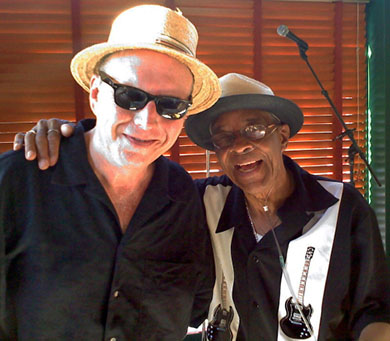
Webb Wilder with late blues legend Hubert
Sumlin at FitzGerald's American Music Festival |
Q - Great
talking to you. Of course, you are touring in support of your new album.
I know that the album's title,
Mississippi
Moderne, was a phrase coined by your
longtime producer, R.S. Field, in describing the sound of your band at
the time. Both of you are from Mississippi. Do you see the album as
being a return to your roots? In sitting down to make the album, what
were your goals and do you think you accomplished them?
In sitting down to make the album, there was a dimly lit path at first
that became somewhat illuminated with Joe V. McMahan's suggestion that I
make a "garage" sort of album. I knew I wanted to do "Yard Dog" as I see
it as sort of an obscure garage rock gem that I heard as a kid, really,
growing up in Hattiesburg on local radio.
We recorded that one and "Lucy Mae Blues" (which I had always wanted to
do) and were very pleased. Then, Joe's studio burned! So, at that point,
all signs pointed in sort of a vaguely R&B/garage direction, which
although focused still, (as per usual) gave me some wiggle room with
genre.
Slowly, one song then, the next either seemed to fit or was written and
then, gradually an album began to take shape that we all felt held water
so to speak. I do see it as a return to my roots, although they have
never been far away at any time.
As is the case with everything I've ever done (so far), it has diversity
or eclecticism. That is true of the content of this album as well as the
individual stories behind why each song is a return to one thing or
another.
Q - Speaking of R.S. Field, he was your
producer for many of your albums. Do the two of you share a musical
kinship? What do you think he brought out of you and your music?
Well, we certainly share a musical kinship. He brought all sorts of
things out in me.
I would say in many ways, he empowered me not only to find my "voice" as
a singer, writer and guitarist but to even try to accomplish anything in
the music "business" to begin with. At the same time, I was often doing
my best to interpret his songs which obviously I am a huge fan of.
On this album, I wound up doing one of his songs with no input from him
on HOW to do it and he loved it! Then, of course, I did some writing
with John Hadley, who is a writer on "Poolside" from "It Came from
Nashville" which "Wilderians" seem to love to this day.
The balance between his influence and taking my own chances with things
is a pretty good one in my view on this album. I can't say enough about
the Beatnecks contributions collectively and individually here as well.
Q - Your music dips into many genres. How
would you describe your music? What did it mean to you to be inducted in
the Mississippi Musicians Hall Of Fame?
Really, it's all kind of rock 'n' roll to me. I say that because I grew
up in what I suppose has come to be known as the "classic rock" era when
the most respected and successful artists made albums that were very
eclectic and diverse so, I just subconsciously felt…KNEW that that was
what I was supposed to do in my attempts to make records.
I also think that great art is flawed as is the human condition so, one
must at least try to reveal a certain vulnerability or more specifically
an individual, human uniqueness or essence in their art. My favorite
artists have roots and then go somewhere with them.
That is what I've tried to do. Inclusion in the Mississippi Musician's
Hall of Fame meant the world to me! After all, Mississippi can boast one
of the most impressive rosters of iconic musical talent of any state in
the union much less any place in the world.
They call Mississippi "the birthplace of America's music." That might be
a bit strong as it seems to claim ALL the credit but, it is damned close
to being true.
I call it "the home office."

photo: Harry Simpson |
Q - Some of your songs have received more
radio play than others over the years. "Tough It Out," "Human
Cannonball" and "Hittin' Where It Hurts" come to mind. In sitting down
to write those songs, did you have any idea they would resonate so well
with the public?
Well, I guess the short answer is "No!" Of course, Bobby (R.S.) wrote
"Tough it Out" (with John David) and "Cannonball" so, I suppose you
would have to ask him.
The two of us did write "Hittin' Where It Hurts." I did and do believe
in those songs but, there are quite a few others I believe in almost as
strongly that we have done which garnered less attention so, you never
know.
I choose to think that you just have to follow your own nose on those
things and figure if you like it someone else will, too.
Q - You also have covered many songs in
your career, including on
Mississippi Moderne.
How do you go about choosing what songs to cover and what do you try to
bring to that song?
There is no set method of how I choose which song to do. Again,
believing in it or getting some kind of emotional "buzz" from it is
probably what allows the singer to sing it with "feeling" which from my
youngest days I have felt to be essential.
There are other considerations like whether it works for a given
artist's style, range, voice, etc. Even when it doesn't appear to "fit"
so to speak, sometimes there can be another "look at it this way" path
into a given song.
I just try to bring some kind of truth, feeling and delivery to a song.
I think the singer must "get up inside" the song or "own it," as some
say.
Q - Do you have any dream projects or
collaborations?
I always dreamed of recording with the great Ian "Mac" McLagan, who not
only was one of my favorite keyboardists, but an important original
member of two of my favorite bands, The Small Faces and the Faces, not
to mention a sideman for everyone from The Rolling Stones to Bob Dylan.
But, now that he has passed, it will sadly never happen. It does mean
the world to me that I did get to know him and spend some time with him.
It was great that he got to hear us play live and seemed to really enjoy
it. I can't claim to have been his best buddy or anything as he never
met a stranger, really but, still he was the coolest. So, that will
never happen.
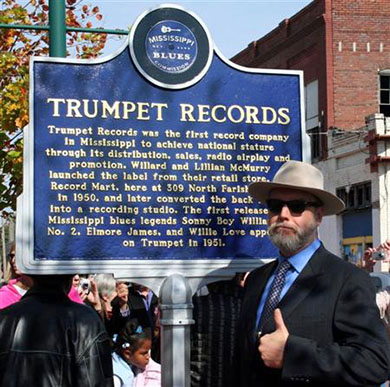
Webb Wilder poses by Trumpet Records'
historic mile marker in Mississippi |
Another pet project that I hope to take on and complete one day is a
tribute to Trumpet Records which was the label owned by my aunt and
uncle, Lillian and Willard McMurry. They recorded all sorts of blues and
hillbilly artists including Elmore James, Sonny Boy Williamson, Willie
Love, Jerry "Boogie" McCann and Jimmy Swan.
I think it would be fun and very worthwhile.
Interviewer Eric Schelkopf has covered the arts and entertainment scene
in Chicago for over 25 years. Visit his informative blog at:
http://www.thetotalscene.blogspot.com/
##
|
Get the party started!
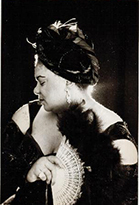
Book a blues band & more with
Cain's Music
Connection |
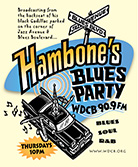
Hambone's
Blues Party on
WDCB 90.9 FM |
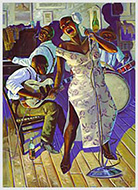
Blue Chicago
536 N. Clark
Chicago, IL |
+ |

